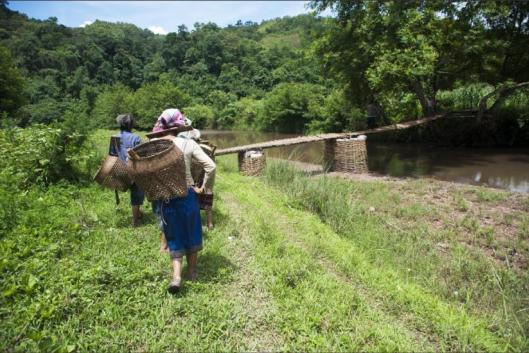In solidarity with the International Day of Peasant Struggle. A day to remember, emphasize and mobilize together against the persecution and violence that peasants suffer on a daily basis around the world.
On 17 April 1996, 19 peasants were murdered. All of them were members of the Landless Movement in the Brazilian state of Pará who were taking part in a land rights protest. As a result of this incident, La Vía Campesina - the largest movement of peasants from all over the world– established the date as the International Day of Peasant Struggle. This is a day to remember, emphasize and mobilize together against the persecution and violence that peasants suffer on a daily basis all over the world as a result of the neoliberal policies of the dominant economic system.
Every year, WRM unites in solidarity with struggles for land, livelihoods and subsistence, and people’s autonomy.
Peasant struggles are intimately related to the struggles of forest-dependent communities. It’s also frequently the case that peasant communities depend on forests, and forest-dependent communities are, at the same time, peasant communities. These communities live, reproduce and maintain their culture and food sovereignty thanks to their lands, forests and habitat.
Another aspect that links these communities is the threats they constantly face due to neoliberal policies that seek to concentrate ownership of land and forests for the benefit of a few - be they transnational corporations, government agencies, tycoons or conservation organizations, with the so-called forest carbon projects (REDD +) or 'compensation' projects in general. Land grabbing continues to expand mainly in the Global south, accompanied by intense oppression, criminalization and violence.
In this bulletin we present an article written by the National Association of Peasants and Local People of Cameroon (Synaparcam, for its French acronym) that details how the Socapalm palm oil plantation company is trying to extend certification with the sole purpose of generating greater profits. Socapalm has been repeatedly reported for its disastrous impact on forests, the environment and local communities. Another article highlights how a new trend and strategy in the expansion of palm oil plantations involves launching programs that claim they will improve the production of food crops. This led to a delegation from the largest peasant confederation of the Democratic Republic of the Congo, the COPACO-PRP, together with WRM, to find out more about the experience of peasant families and the PAPAKIN program in the province of Kwilu, a region that since colonial times has a history of dispossession, struggle, deforestation, land grabbing and resistance.
This edition of our bulletin also includes an article that highlights a tactic that has been used by logging and plantation companies in the forests of the Congo Basin. The most prominent logging companies in the Republic of Congo, the Democratic Republic of Congo and the Central African Republic have links to the plantation projects that cause the forests to be cut down. Moreover, plantation companies that have problems financing their operations are using timber extraction as a way to raise investment capital.
The case of the city of Três Lagoas, in the Brazilian state of Mato Grosso do Sul also demonstrates the strong influence that plantation and pulp companies can exert on populations, with the main aim of neutralizing resistance. Taking advantage of the absence of the State, the companies have managed to expand operations in these territories with the introduction of 'social projects' that make families dependent on their presence. While from Uruguay, another article warns us about the latent threat of the installation of a third mega pulp mill in that country, in this case belonging to the Finnish company UPM.
From Acre, Brazil, we present the story of a community that is part of a 40,000-hectare forest carbon project or REDD+ and their difficult struggle for access to and tenure of land, especially when the rubber tappers community that has lived there for generations, doesn´t have the necessary legal documents. The project, for its part, has already sold numerous carbon credits and, to date, only provided the local community with dental kits and a visit to the dentist.
Communities of peasants and those who are dependent on the forests are rooted to their lands, forests and habitats. And it is they who resist efforts to concentrate more and more land. Their resistance involves protecting their lands and forests as well as their ways of conceiving and relating to the world around them. These other ways of being converge stories and knowledge that originated countless generations ago.
This fight for resistance and defense of life is also reflected in an article about the harmful advance of the agricultural industry and mega-tourism in Bali, Indonesia, where the communal grassroots organization, which is intimately linked to conceptions of the world that prioritize a direct and sacred relationship with their habitats, has been able to resist companies that wish to strip the people of their land, forests and water sources.
Enjoy the reading!
